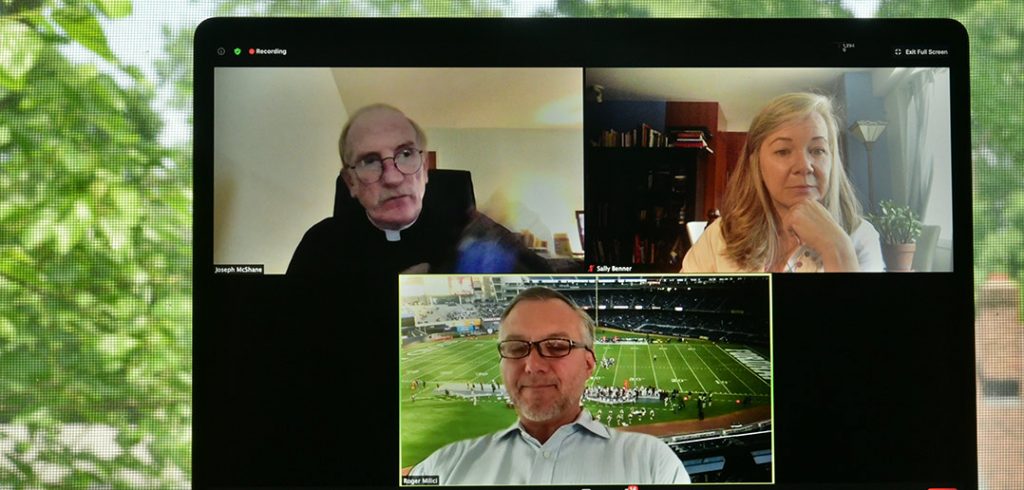“We’re living in a very, very unusual time, an unprecedented time,” Father McShane said during a Saturday morning address, referring to the confluence of the coronavirus pandemic and nationwide protests against police brutality and racial injustice galvanized by the May 25 death of George Floyd at the hands of Minneapolis police.
In addition to Fordham’s potential to promote racial justice, Father McShane spoke about the possible impact of the pandemic on enrollment this fall and the University’s plans for holding classes amid the uncertainty it has fostered. He gave a special welcome to this year’s newest Jubilarians, members of the Class of 2015, as well as the newest Golden Rams, members of the Class of 1970, who also graduated in a year of tumult, one that saw on-campus protests over the war in Vietnam.
In his remarks, Father McShane emphasized that a virtual Jubilee is still Jubilee.
“The format is virtual; the feelings are real,” he said. “So it’s not just a virtual Jubilee; it’s a heartfelt Jubilee at a time of not only great turmoil but great opportunity—opportunity to show what Fordham brings to the world.”
The University is planning to invite this year’s Jubilarians to next year’s Jubilee celebration, said Roger A. Milici Jr., vice president for development and university relations, who took part in the session.
Approximately 150 people attended the virtual Jubilee gatherings, which included a Friday night “Wine 101” tasting and both a yoga and meditation session and a virtual Mass in the University Church on Sunday. Father McShane spoke Saturday during a “Coffee and Conversation” session moderated by Sally Benner, FCRH ’84, vice chair of the Fordham University Alumni Association Advisory Board.
Working for Racial Justice
In his talk on Saturday, Father McShane spoke of the long and troubled history of race in the U.S.
“As we all know, the past two weeks have been weeks where the United States has been really challenged to examine its conscience,” he said. Now is the time to engage “in deep conversation with one another across age groups, across socioeconomic groups, across racial divides,” he said.
“I think at this moment, Fordham has a very special role to play,” Father McShane said. “I think those characteristics of heart and mind that have always distinguished Fordham graduates—character, conscience, competence, compassion, and deep commitment to the cause of the human family, out of love for the Gospel—those are extraordinarily important gifts that we bring, extraordinary things that enable us to help the national conversation to go forward.”
Asked what the first steps might be, he noted that St. Ignatius Loyola, founder of the Society of Jesus, called for “an honest examination of our own heart.”
“This is difficult stuff. It takes time. We have to ask ourselves what is it that stands between me and entering freely into a conversation, and respectfully into a conversation, which will allow us to listen and be listened to?
“I’d say it begins with humility, [a]realization that we don’t have all the answers.”
Plans for the Fall
Asked about the enrollment picture for this fall, Father McShane said the University is wrestling with uncertainties about the potential size of the returning class as students and their parents ponder the option of taking a “gap” year. Fordham’s budget is “in much better” shape than those of other colleges and universities, he said, but there’s concern about international students’ enrollment because consulates have closed due to the pandemic, slowing the processing of visas.
On the other hand, he said, summer session enrollments “have gone through the roof,” even though the classes are all online, “and that’s really heartening for us.” The number of returning students seems on track to increase compared with a normal year, perhaps partially because of less interest in studying abroad, he said.
He praised faculty members’ “extraordinary” efforts to quickly make the transition to online education in March. “Most of them had never taught a virtual course before. They had never dealt with online education,” he said.
Faculty members continue to help and teach one another, forming “networks of instruction for instruction,” he said. The University is overhauling course formats to create a “flexible hybrid learning environment,” in the words of Provost Dennis C. Jacobs, Ph.D., in case the pandemic prompts new mandates for sheltering in place this fall.
Embracing the Bronx
On the topic of racial justice, Father McShane also spoke of how Fordham is seeking to listen to and engage with its neighbors in the Bronx, overwhelmingly a “borough of color,” such as helping local merchants draw up business plans and apply for U.S. Small Business Administration loans and providing support through the graduate schools of education, social service, and law to help people near its New York City campuses cope with current stresses.
He said faculty and administrators are coming up with ideas about how the University can respond to nationwide protests that he called “a cry of the heart from the African American community.”
The conversation turned to two recently deceased titans of Fordham—Joseph Cammarosano, Ph.D., the Fordham professor emeritus and administrator who guided the University through difficult times, and Joseph A. O Hare, S.J., president of Fordham from 1984 to 2003.
During times of turmoil in the Bronx, when many were questioning whether Fordham should remain in the borough, Father O’Hare not only resisted but bravely said, “‘We’re building a library, and we’re building the library to make a statement,” Father McShane said. “‘We’re the Bronx and the Bronx is us, and we’re not going to turn our back on it.’”

